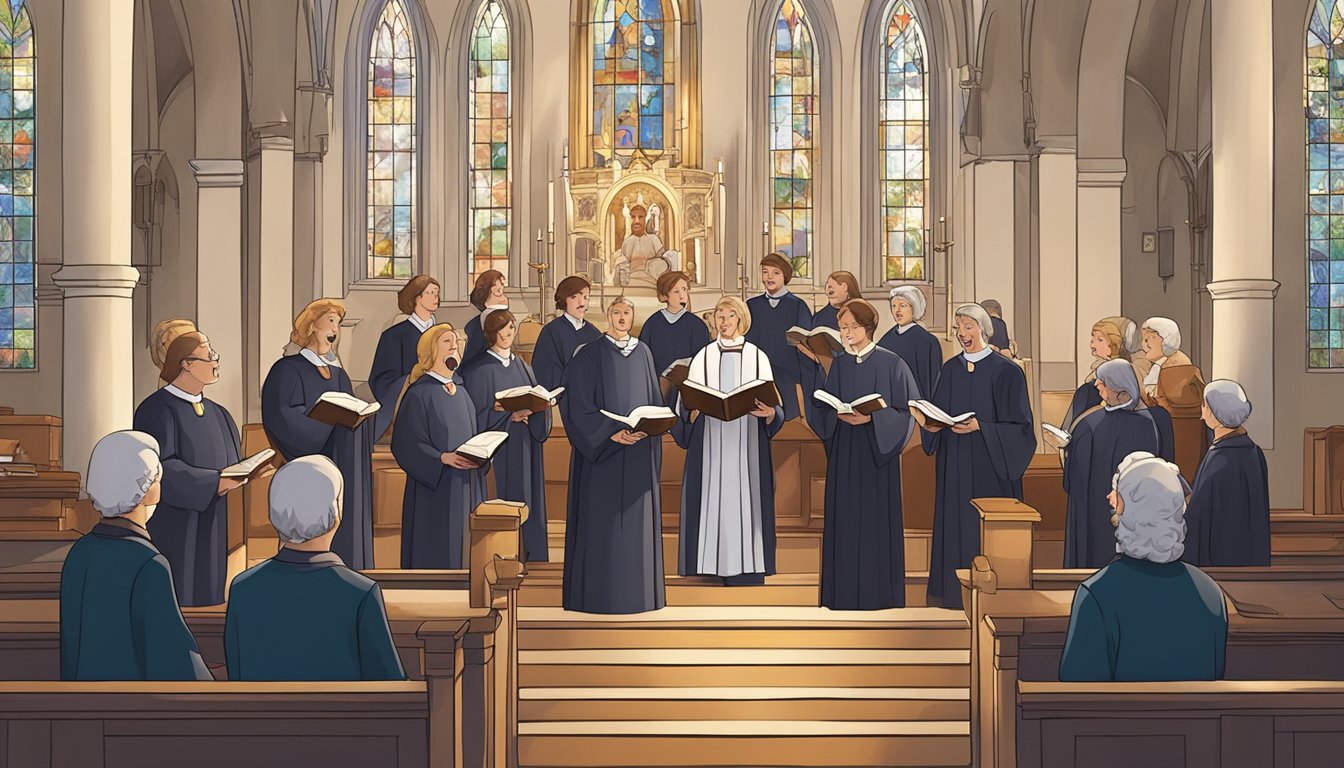Hallelujah, written by Canadian singer-songwriter Leonard Cohen, is a song that has captured the hearts of people all over the world. It has been covered by countless artists and featured in numerous films and TV shows. But is Hallelujah a Christian song? This is a question that has been asked time and time again, and the answer is not as straightforward as you might think.

The origins of Hallelujah can be traced back to the mid-1980s when Leonard Cohen first recorded the song for his album Various Positions. The song’s musical composition is hauntingly beautiful, with its slow, melancholic melody and poetic lyrics. However, the song’s cultural impact goes far beyond its musical qualities. Hallelujah has been interpreted in many different ways, with religious and spiritual interpretations being just one of many. The song’s themes of love and relationship have also struck a chord with listeners, making it a timeless classic that continues to resonate with people today.
Key Takeaways
- Hallelujah is a song written by Leonard Cohen that has captured the hearts of people all over the world.
- The song’s origins can be traced back to the mid-1980s when Cohen first recorded it for his album Various Positions.
- Hallelujah’s cultural impact goes far beyond its musical qualities, with religious and spiritual interpretations being just one of many.
Origins of ‘Hallelujah’
Leonard Cohen’s Inspiration

Leonard Cohen’s iconic song ‘Hallelujah‘ was born out of his artistic struggle and personal reflection. According to recording-history.org, the song’s creation took place in the early 1980s, a period marked by Cohen’s deep introspection and spiritual exploration. Cohen reportedly wrote around 80 draft verses for ‘Hallelujah’ over a span of several years.
In an interview with The Guardian, Cohen said that he spent a lot of time working on the song, trying to get the lyrics just right. He described the process as “laborious” but also “joyful.” Cohen was known for his attention to detail, and ‘Hallelujah’ is a testament to his meticulous approach to songwriting.
Biblical Themes in ‘Hallelujah’
‘Hallelujah’ contains religious imagery and references, which has led some to believe that the song is a Christian hymn. However, as noted by ChristianWebsite.com, Cohen did not originally intend for the song to be a Christian song. Rather, the song is more about the universal human experience of struggle, redemption, and the search for meaning.
That being said, there are certainly biblical themes present in ‘Hallelujah.’ For example, the song references King David, who is known for his psalms of praise to God. The line “I heard there was a secret chord that David played and it pleased the Lord” is a direct reference to David’s musical abilities. Additionally, the song touches on the story of Samson and Delilah, as well as the story of Bathsheba and King David.
Overall, ‘Hallelujah’ is a deeply introspective and poetic piece that has resonated with listeners for decades. While the song is not strictly a Christian hymn, it does contain religious themes and imagery that make it a powerful and thought-provoking work of art.
Musical Composition
https://www.youtube.com/watch?v=suXXd9j529M&embed=true
Melody and Chords
The musical composition of “Hallelujah” is a masterpiece in its own right. The song is written in 12/8 time, which gives it a gospel feel. The melody is hauntingly beautiful, with a repetitive chorus that emphasizes the word “Hallelujah.” The song is written in C-major, and the chord progression is C, F, G, and A-minor, which is commonly referred to as the “fourth, fifth, minor fall, and major lift.”
The chord progression used in “Hallelujah” is a common one in pop music, but the way it is used in this song is unique. The chords are used to create tension and release, which is what makes the song so powerful. The use of the A-minor chord, which is a minor chord, in the progression adds to the melancholic feel of the song.
Lyrical Analysis
The lyrics of “Hallelujah” have been the subject of much debate over the years. While the song has become a beloved classic, there has been much discussion over whether it can be classified as a Christian song. The song contains religious references, but they are not all specifically Christian.
The word “Hallelujah” itself is a Hebrew word that means “praise the Lord.” The song also references the biblical story of Samson and Delilah, as well as King David. However, the song also contains secular references, such as the line “you say I’m dirty, but I feel pretty.”

Overall, the lyrics of “Hallelujah” are open to interpretation. Some people see the song as a religious hymn, while others see it as a love song or a song about the human experience. The beauty of the song is that it can be interpreted in many different ways, depending on the listener’s perspective.
Cultural Impact
https://www.youtube.com/watch?v=oU_WO69-FVM&embed=true
Since its release in 1984, Leonard Cohen’s “Hallelujah” has become a widely recognized and beloved song, with a significant cultural impact. The song has been covered by numerous artists, featured in various media and entertainment, and has become a staple in pop culture.
Cover Versions
One of the reasons for the song’s cultural impact is the numerous cover versions that have been produced over the years. Jeff Buckley’s 1994 version of “Hallelujah” is considered by many to be one of the best covers of the song. John Cale’s cover, which was released in 1991, was the first to introduce the song to a wider audience. Rufus Wainwright’s cover, which was featured in the movie “Shrek,” also gained significant popularity.
Other notable covers of “Hallelujah” include the version by the a cappella group Pentatonix, which won a Grammy Award in 2017, and the cover by the Canadian Tenors, which was featured on their tribute album to Leonard Cohen.
Use in Media and Entertainment
“Hallelujah” has also been featured in various media and entertainment. The song has been used in numerous television shows, including “The West Wing,” “The O.C.,” and “The Voice.” It has also been featured in movies such as “Watchmen” and “Shrek.”
« Is “Hallelujah” a Christian Song?
Is a Protestant a Christian? Exploring the Relationship between Protestantism and Christianity »
The use of “Hallelujah” in “Shrek” is particularly noteworthy, as it introduced the song to a younger generation and helped to popularize it even further. The song was used to signal human triumph in the movie, rather than a Christian message.
Overall, the cultural impact of “Hallelujah” is undeniable. The song’s popularity and numerous covers and uses in media and entertainment have cemented its place as a beloved and iconic piece of music.
Religious and Spiritual Interpretations
https://www.youtube.com/watch?v=1ZoJ0FM0Dzw&embed=true
Christianity and ‘Hallelujah’
The question of whether ‘Hallelujah’ is a Christian song is a complex one. Leonard Cohen, the song’s writer, was Jewish, but he often incorporated Christian imagery and themes in his work. Some Christians have embraced the song as a powerful expression of faith, while others have criticized it for being too ambiguous or lacking overtly Christian references.

One interpretation of ‘Hallelujah’ from a Christian perspective is that it is a song of praise to God. The word “hallelujah” itself is a Hebrew word meaning “praise the Lord,” and the song’s lyrics contain many references to biblical stories and characters, such as King David and Samson. The song’s refrain, “I did my best, it wasn’t much / I couldn’t feel, so I tried to touch / I’ve told the truth, I didn’t come to fool ya / And even though it all went wrong / I’ll stand before the Lord of Song / With nothing on my tongue but Hallelujah,” can be seen as an expression of faith in God’s mercy and forgiveness.
Judaism and ‘Hallelujah’
While ‘Hallelujah’ is often associated with Christianity, it is also a deeply Jewish song. Leonard Cohen was a practicing Jew, and many of the song’s lyrics draw on Jewish themes and imagery. For example, the line “the holy or the broken Hallelujah” can be interpreted as a reference to the Jewish concept of tikkun olam, which means “repairing the world.” The idea is that the world is broken and in need of repair, and it is the responsibility of all people to work towards making the world a better place.
Another Jewish interpretation of ‘Hallelujah’ is that it is a song of spiritual longing. The song’s lyrics contain many references to the divine, such as “the secret chord that David played / and it pleased the Lord,” and “you say I’m dirty but I want to be clean / and I want to be worthy.” These lines can be seen as expressions of a desire to connect with God and to live a life of meaning and purpose.
Other Religious Perspectives
While ‘Hallelujah’ is often associated with Christianity and Judaism, it has also been embraced by people of other faiths and spiritual traditions. For example, the song has been used in Buddhist meditation practices, and it has been sung at interfaith religious services.
One interpretation of ‘Hallelujah’ from a more universal spiritual perspective is that it is a song of transcendence. The song’s lyrics contain many references to the human experience of suffering and loss, but they also express a sense of hope and redemption. The line “love is not a victory march / it’s a cold and it’s a broken Hallelujah” can be seen as a reminder that even in the midst of pain and sorrow, there is still beauty and meaning to be found in life.

Overall, the question of whether ‘Hallelujah’ is a Christian song is a complex one that depends on one’s interpretation of the song’s lyrics and themes. While the song contains many references to religious and spiritual ideas, it is ultimately up to the listener to decide how to interpret and understand its message.
Themes of Love and Relationship
https://www.youtube.com/watch?v=LU4-QxCDNs0&embed=true
The song “Hallelujah” by Leonard Cohen is known for its deep and complex lyrics that explore various themes of life, including love and relationships. The song has been interpreted in many ways, and some have questioned whether it is a Christian song. However, regardless of its religious connotations, the song’s themes of love and relationships are universal and relatable to people of all faiths.
Romantic Elements
One of the central themes of “Hallelujah” is romantic love. The song’s lyrics describe a passionate and intense love affair between two people. The lyrics are filled with romantic imagery, such as “the holy or the broken Hallelujah” and “you say I love you to the morning light.” These lines convey the idea that love is both beautiful and fragile.
Love Beyond Romance
The song’s lyrics also explore love beyond romance. In one verse, Cohen sings, “Love is not a victory march, it’s a cold and it’s a broken Hallelujah.” This line suggests that love is not always easy or joyful, and that it can be painful and difficult. The song’s exploration of love beyond romance is one of the reasons why it has resonated with so many people.

Overall, “Hallelujah” is a song that explores the many facets of love and relationships. Its lyrics are filled with passion, joy, and pain, and they offer a glimpse into the complexities of human emotions. Whether you are religious or not, the song’s themes of love and relationships are universal and relatable.
The Song’s Journey to Fame
https://www.youtube.com/watch?v=LRP8d7hhpoQ&embed=true
Critical Reception
When Leonard Cohen released “Hallelujah” in 1984 on his album “Various Positions,” it received little attention and was not a commercial success. However, it soon gained popularity through covers by other artists. Rolling Stone described it as a “cryptic, indecipherable, and haunting ballad.” The song’s lyrics are open to interpretation, with religious imagery mixed with secular themes of love, sex, and loss.
Chart Performances
Despite its slow start, “Hallelujah” has become one of the most covered songs in history. It has been featured in numerous TV shows and movies and has been performed by artists of various genres, including Jeff Buckley, Rufus Wainwright, and Pentatonix.
The song has also charted multiple times on the Billboard Hot 100, with various covers reaching the top 40. Jeff Buckley’s version, released in 1994, is considered by many to be the definitive rendition and peaked at number 64 on the chart. However, it was not until after Buckley’s death that the song gained mainstream popularity. In 2008, after being featured on the TV show “The X Factor,” Alexandra Burke’s cover of the song reached number one on the UK singles chart.

Despite its popularity, “Hallelujah” has faced criticism for being overplayed and for losing its original meaning. However, the song’s enduring appeal and ability to evoke strong emotions continue to make it a beloved classic.
Overall, “Hallelujah” is a song that has undergone a remarkable journey to fame. Despite its initial lack of success, it has become a cultural phenomenon and a staple in popular music. Its enduring popularity is a testament to the power of music to transcend boundaries and touch the hearts of people around the world.
Artistic Interpretations
https://www.youtube.com/watch?v=dLk9pzmaFHY&embed=true
Metaphor and Poetry
One of the reasons why “Hallelujah” by Leonard Cohen is such a beloved song is because of its poetic lyrics and use of metaphor. The song is filled with religious imagery and references, but it is not a straightforward Christian song. Rather, it is a deeply introspective and poetic piece that explores the universal human experience of struggle, redemption, and the search for meaning.
Cohen uses powerful metaphors throughout the song to convey his message. For example, in the first verse, he compares love to a “cold and broken Hallelujah.” This metaphor suggests that love can be painful and difficult, but it is still worth celebrating and praising.
Message and Meaning

The message and meaning of “Hallelujah” are open to interpretation and have been debated by fans and critics for years. Some see the song as a meditation on the power of love and the beauty of life, while others view it as a commentary on the complexities of faith and the human condition.
One thing is clear, though: the song is timeless. Its message and meaning continue to resonate with people of all ages and backgrounds. The use of religious imagery and metaphor allows the song to be interpreted in many different ways, making it a powerful and thought-provoking piece of art.
In conclusion, “Hallelujah” is not a straightforward Christian song, but rather a complex and poetic exploration of the human experience. Its message and meaning are open to interpretation, and its use of metaphor and poetry make it a timeless piece of art.
Live Performances and Tributes
https://www.youtube.com/watch?v=tcOQSk_cMO0&embed=true
Notable Live Renditions
Over the years, “Hallelujah” has been performed by various artists, each adding their own unique touch to the song. One of the most famous renditions of the song is Jeff Buckley’s version, which is often regarded as the definitive version of the song. Buckley’s haunting and emotional performance of the song has been praised by many, and his version of the song has become a classic in its own right.

Other notable live performances of “Hallelujah” include k.d. lang’s rendition at the 2005 Juno Awards, where she paid tribute to the late Canadian singer-songwriter Leonard Cohen, who wrote the song. Bono and Regina Spektor have also performed the song live, each adding their own unique style to the song.
Memorial Tributes
“Hallelujah” has also been used as a tribute song to honor those who have passed away. Susan Boyle performed the song on the TV show “Britain’s Got Talent” as a tribute to her late mother, who had always encouraged her to pursue her singing career. Brandi Carlile performed the song at the 2018 Grammy Awards as a tribute to the late Tom Petty.
In Canada, “Hallelujah” has been used as a tribute song to honor the legacy of politicians and public figures. In 2011, Canadian musician Steven Page performed the song at the state funeral of Jack Layton, the leader of the New Democratic Party, who had passed away from cancer. Willie Nelson also performed the song at the funeral of former Canadian Prime Minister Pierre Trudeau.
Overall, “Hallelujah” has become a timeless classic that has been performed and interpreted by many artists over the years. Its emotional and spiritual themes have resonated with audiences around the world, making it a beloved song that will continue to be performed and enjoyed for generations to come.
Influence on Music Genres
https://www.youtube.com/watch?v=GJA-ZzEfvK4&embed=true
Gospel and Christian Music

Since its release, “Hallelujah” has been covered by numerous Christian and gospel artists. The song’s message of praise and worship has resonated with many in the Christian community, leading to its inclusion in many religious services and events. The song’s use of biblical imagery and themes has also contributed to its popularity among Christian audiences.
In addition, “Hallelujah” has been adapted into numerous gospel arrangements, with artists such as Brooklyn Tabernacle Choir and Donnie McClurkin putting their own spin on the song. These adaptations often feature more upbeat instrumentation and gospel-style harmonies, further emphasizing the song’s message of praise and worship.
Rock and Roll’s Adaptation
While “Hallelujah” is not typically considered a rock and roll song, it has still had a significant impact on the genre. The song’s use of powerful, emotive lyrics and instrumentation has inspired many rock and roll artists, leading to numerous covers and adaptations of the song.
One of the most notable adaptations of “Hallelujah” in the rock and roll genre is Jeff Buckley’s hauntingly beautiful version of the song. Buckley’s stripped-down arrangement, featuring just his voice and guitar, emphasizes the song’s emotional depth and vulnerability, making it a beloved classic among rock and roll fans.
Overall, “Hallelujah” has had a significant impact on both gospel and rock and roll music, inspiring numerous adaptations and covers in both genres. Its message of praise and worship has resonated with many in the Christian community, while its powerful lyrics and emotive instrumentation have made it a beloved classic among rock and roll fans.
Legacy and Continuations

The Holy or the Broken
Alan Light’s book, “The Holy or the Broken,” explores the legacy of Leonard Cohen’s song “Hallelujah.” The book examines the song’s history, its impact on popular culture, and its enduring appeal. According to Light, “Hallelujah” is a song that has transcended its original meaning and become a cultural touchstone.
The book delves into the song’s religious references and its use of biblical imagery. Light argues that the song’s message is one of hope and redemption, and that it speaks to people of all faiths and backgrounds. He also explores the various interpretations of the song, including the idea that it is a meditation on the creative process itself.
Cohen’s Later Works
After “Hallelujah,” Leonard Cohen continued to write and record music until his death in 2016. His later works, such as “Old Ideas,” continued to explore themes of spirituality and faith. In “Old Ideas,” Cohen reflects on his own mortality and the meaning of life.
Cohen’s music has continued to influence artists in a variety of genres, from folk to hip hop. His legacy as a songwriter and poet is secure, and his influence can be heard in the work of countless musicians.
Overall, “Hallelujah” remains one of Leonard Cohen’s most enduring and beloved songs. Its message of hope and redemption continues to resonate with audiences around the world, and its legacy is secure as one of the great works of modern music.
Frequently Asked Questions
What is the spiritual significance of Leonard Cohen’s ‘Hallelujah’?
The song ‘Hallelujah’ by Leonard Cohen has been interpreted in various ways, but it is generally considered to be a song of praise to God. The word “Hallelujah” is a Hebrew word that means “Praise the Lord”. The song’s lyrics are filled with biblical references, such as the story of Samson and Delilah and King David’s affair with Bathsheba. The song’s message is one of hope and redemption, and it has resonated with people of all faiths.
Can ‘Hallelujah’ be classified as a religious hymn?
While ‘Hallelujah’ contains religious imagery and themes, it is not considered a traditional religious hymn. The song’s lyrics are open to interpretation, and its message is universal. It has been covered by artists of all genres, from Jeff Buckley to k.d. lang, and has become a cultural touchstone.
Why do some people find the song ‘Hallelujah’ controversial?
Some people find the song ‘Hallelujah’ controversial because of its use of sexual imagery and references to biblical stories. The song’s lyrics have been interpreted in various ways, and some people feel that the song’s message is at odds with their religious beliefs. However, many people find the song to be uplifting and inspiring.
Is it common to play ‘Hallelujah’ during Christmas celebrations?
While ‘Hallelujah’ is not specifically a Christmas song, it has become a popular choice for holiday celebrations. The song’s message of hope and redemption resonates with the themes of the holiday season, and its popularity has only grown in recent years.
What makes ‘Hallelujah’ a popular choice for funerals?
‘ Hallelujah’ has become a popular choice for funerals because of its message of hope and redemption. The song’s lyrics speak to the idea that death is not the end, and that there is hope for a better life beyond this one. Its popularity at funerals is a testament to the song’s enduring message of hope and love.
Who was the inspiration behind the lyrics of ‘Hallelujah’?
The inspiration behind the lyrics of ‘Hallelujah’ is not entirely clear. Leonard Cohen himself has said that the song was inspired by the biblical story of King David, but the lyrics are open to interpretation. The song’s message of hope and redemption has resonated with people of all walks of life, and its popularity continues to grow.














